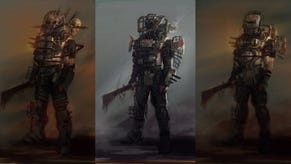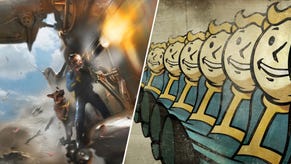Interview part one - THQ Core boss Danny Bilson on Move/Kinect, creativity, MOH controversy, tons more
When you hear "THQ," what springs to mind? Wrestling games? Ni-ni-ni-ni-ni-ni-ni-ni-Nickelodeon? Well then, you might want to crawl out from under that rock you've spent the last few years living underneath.
Where's Tim Schafer these days? THQ. How about Ninja Gaiden/Dead or Alive creator Tomonobu Itagaki? Same. And what's this about Guillermo del Toro? The bottom line: THQ's come a long, long way - but it's far from done.
Leading the way has been THQ Core boss Danny Bilson, who was kind enough to take some time out from his busy schedule of interacting with some of the most interesting people in the industry to chat with little ol' us. So we basically projectile vomited questions in his face, which he was surprisingly ok with.
Click past the break to hear Bilson's thoughts on core Move/Kinect games, the need for creativity in the gaming industry, how we should handle touchy subjects like the recent Medal of Honor controversy, 3D, Tim Schafer, and plenty more!
[Interview by Nathan Grayson]
THQ’s Move/Kinect stance seems to be more casually oriented. A quote a couple weeks back pointed to less expensive, easier-to-develop games. Is there any interest in designing a hardcore game for either platform, though? I want to physically knock things down in Red Faction, basically.
Oh, there is by me if there’s an install base. You know, we just have to see how it goes. I have an idea for a game that’s just big and expensive and really deep. We just gotta see if there’s an install base that’ll support it.
Our group is doing a really expensive game for Move and Kinect right now. We just decided to invest a lot more money in it. It’s coming out sooner rather than later, but we haven’t officially done the big announcement on it. But literally, we got to the point in development, and we decided “You know what? We gotta make this the best in the class of what it is.” So my group on the core side, we’re actually spending a lot of money on one game in particular that’s gonna ship at the end of March. But we haven’t quite announced it yet.
What the Kids and Casual group is doing, I’m not even sure what they have on there. That’s not my group. I know they have Biggest Loser and they might have… if I say, I might be wrong. So I don’t want to say. But we have one big game on Move, Kinect, and Wii. We’ll be announcing it really soon.
With Homefront, you’re launching a new IP pretty late in the current console cycle. What’s that like? Surely it’s a pretty big risk. Otherwise, we’d be seeing other publishers do it more frequently, right?
I don’t even think about the console cycle anymore, because when is the next console gonna be? I’m just worried about launching a great IP. I mean, in this world, most of the rules like that – all bets are off.
Early in a cycle, late in a cycle – I think only great games are gonna sell, and when Homefront launches, it’ll have been in development for three years. We’ve invested a tremendous amount of people and money and time into it to give everybody an incredible, unique experience. It has uniqueness in the shooter category, and it also have familiarity along with sort of the Call of Dutys and Medal of Honors and stuff. And if you do really well in that genre, I believe you can sell a lot of units and justify the price.
But I don’t think about early or late in the console cycle anymore, because we don’t even know when the next console cycle is. All bets are kind of off. The world has changed, and what we have to do is make great games and give people new places to go. And Homefront absolutely is a new place to go.
Between Homefront, Darksiders, and Costume Quest, you’ve been focusing a lot on new IPs lately. Do you think you’re setting a pace the rest of the industry should follow? Do we need more fresh faces and environments?
Absolutely. I think there’s something called IP fatigue. You know, you can sequel and sequel and sequel, but if you don’t innovate on that idea, people are gonna go “Why do I want to spend $60 to play more of what I’ve played before when, right next to it, is something brand new?”
Take Red Dead [Redemption]. It was brand new. I’d rather go someplace new. If I only have one choice when I walk into a store – and I don’t know how many people can buy two or three games at a time since they’re so expensive. But if I had $60 to invest in May of last year, I’d have bought Red Dead, because I haven’t been to the wild west in a really great way in a game. I’d pick that over other experiences that were around at the time. So I’m a big believer in fresh experience – letting people go to places they haven’t been before. And that’s a way we want to compete.
So Homefront, again, has familiarity in sort of a modern combat shooter experience, but it absolutely is a different place. I mean, you’re fighting in an occupied United States where all the familiar is different. It’s not a military game per se – except in the multiplayer. The single-player’s about four civilians fighting. So it’s really unique as it can be without breaking too far out of the genre.
But I’m a big believer in original IP. Franchises, I think, have to use the same brand, but give somebody a really unique experience in that brand. Don’t just do the same thing plus. Don’t just make it a continuation. Because as I said in that panel, a fictional hook where you’re continuing a story – the first thing you’ve got to do is make sure everybody finishes the game. And when fiction takes over and becomes the driver, that’ll be interesting. But it hasn’t happened yet.
So I like to say that we’ve got to make a fresh experience in a familiar wrapper with sequels. Like, I know what Homefront 2 is. It’s not a repeat of Homefront 1. It doesn’t take place in the same place or anything like that.
Speaking of Homefront, it’s obviously fictional, but it has something of a real-world basis. Meanwhile, EA’s Medal of Honor recently got a slap in the face for cozying up a little too close to reality. Do you think war games should continue to have some degree of separation from current events – ala Homefront or Call of Duty? Or is there a place for videogames in the modern global sphere?
Well, my particular issue about playing in a current event is, if people are bleeding and dying, and you want to have an entertainment experience, you have to be sensitive to the fact that people are bleeding and dying. And I – me personally – may not want to go there today.
It’s not about respect for the troops or anything like that. It’s kind of a really painful reality; war is not a pretty thing. And if we’re creating entertainment experiences around it, I would vote for going somewhere a little fantastic – a little more of war movie. That’s what it is. I would like to be in a war movie more than I’d want to be in a real war. I think that’s kind of the choice I’ll make when I’m in control.
And it’s not about respect or disrespect or anything like that, because I know that the guys on Medal of Honor who are friends of mine have tremendous respect for the troops. They had Tier One guys working with them on the game. So it’s not [a respect issue]. It’s just about taste. I’m a big believer in escapist entertainment, so I want to escape. I don’t want to go right into the headlines and be right there. And I don’t even know if that’s exactly what it is. It might have worked for them, because they got tremendous publicity around it. People were talking about it and all of that.
But we’ll do more of the Homefront type of thing, which is speculative fiction. And it’s very reality based in a future reality. We did tons of research on what if. We worked with people in Washington DC on it and spoke with experts on East Asia. How might it happen? How could that kind of an invasion happen? So it’s believable in its own reality, but nobody’s gonna be saying, “Oh my God, this is happening. I don’t want to go there.”
You’re the latest publisher to take Tim Schafer and Double Fine under your roof. I love Tim – seriously, Tim, call me – but I have to admit: his games have a history of cult-hit status. As in, there’s not a whole lot of money to be made. Why’d you decide to publish Double Fine’s games?
Well, I’m a big fan. I think Grim Fandango is one of the masterpieces of videogame history. And then it just comes down to what game we’re making, and do we believe it can work? The games we’re publishing with Tim so far are smaller bets. They’re downloadable games, but they have that sensibility and wit. Costume Quest comes out soon, and it’s a Halloween game. It’s really cool. And we have another one that hasn’t been announced yet with him.
I do what I believe in, and I believe that he is going to have a breakout massive hit. Because what happens with his games is, they may not sell initially, but they last. And they get passed around. And I think there’s a lot of equity in Tim Schafer that people like you – your age – are big fans and people my age are big fans. It’s just the next one of his is gonna be the financial windfall. You know, it really is, and I hope to be the publisher that publishes his next big game.
So we’re really big at THQ now on attracting the best, most creative innovative talent in the world to back up the strategy of giving people new experiences. So we’re very anxious to do more stuff with Tim. It’s not about what happened in the past; it’s about what’s gonna happen in the future.
Lately, you’ve been announcing games pretty early in the dev cycle. Devil’s Third isn’t set to launch until 2012, and – for all we know – Metro 2034’s release year could be in its title. Why announce things so early? Is there a strategy behind that?
Yeah, there is. One, we’re excited about them. Ok, it’s not exactly a marketing strategy, but we’re excited. We’re a company in transition at THQ. What we want to talk about is where we’re going – not where we’ve been. Am I worried that people aren’t gonna remember Devil’s Third two years from now? Two years from now, we’re gonna have an insane marketing campaign leading up to the game’s release, so whether or not you’ve heard of it yet, you’re gonna hear of it then.
But what we’re trying to say to fans and gamers and the community is we are making cool stuff. And the future of THQ is about making really exciting games. It’s a very different THQ than the THQ of the past. It has a lot to do with our brand and letting people understand where we’re headed.
Also, I’m a big game fan, right? I read all the magazines and everything. I’m interested. I want to know. I’m not saying to that company, “Gee, why’d you announce two years from release?” The only negative for me would be “Aww man. I’ve got to wait two years for that?” That’d be the only thing, and I have no problem with that as long as – when we get to the release window – we pour it on like a movie launch. Then we’ll sell our units.
Obviously, 3D’s a big component of this year’s GDC Online. Many developers I’ve spoken to basically consider it a foregone conclusion that 3D’s the future. Gamers, though, don’t seem to agree. Some of them even compose small novels on message boards about why it’s a waste of time. So where do you stand? Is 3D going to be universal in a few years? Or is it just a passing fad?
I don’t know. Honestly, I don’t even want to comment on whether I think it’s the next big thing or not. It’s not that hard to do, first of all. Not that many people have 3D TVs, first of all, so how much does it really matter? It adds kind of a coolness factor to De Blob. Our PS3 and 360 version is gonna be in 3D. It gives it a position and just another interesting thing to say about it, because it looks really cool in 3D.
It’s just fun. But it’s not for the masses. I mean, it’s all about the average gamer and what TV they’re playing on. And that’s who the game’s built for. It doesn’t take much to adjust it for 3D, and it was worth it for us to invest in that.
The other game is Metro. Metro 2033, when you put it through the Nvidia card on the PC, looks ridiculous. Because the way they built the game, they modeled everything. The Russians model everything. And it looked great, and Nvidia sponsored a bunch of stuff with it. So 2034 is gonna be in 3D on consoles also.
Will we do the little adaptations on everything, though? It’s just like Move or Kinect. If everybody winds up in 3D land with 3D TVs, we’ll be there. But on those two games, we thought it would be interesting for both of them because of the kinds of experiences they offer.
Check back tomorrow for part two!









